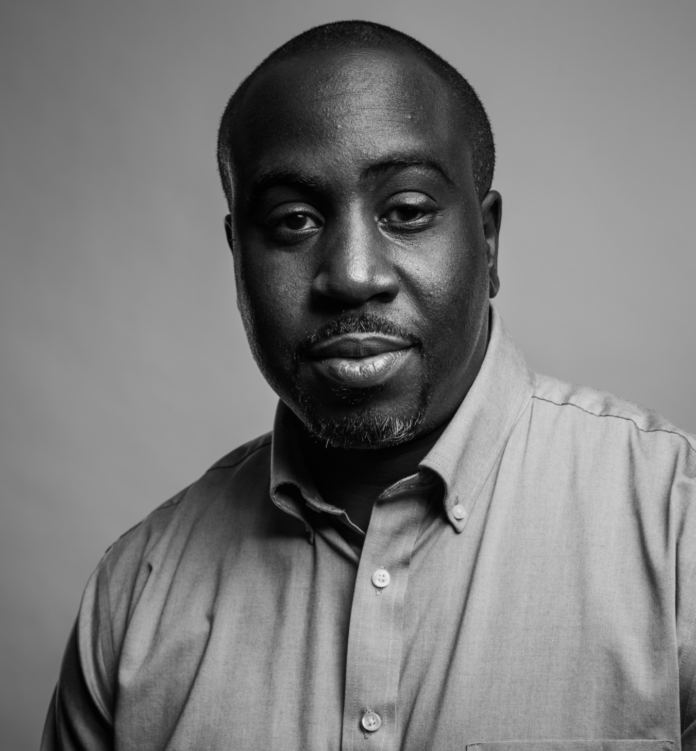On Oct. 25, Chenjerai Kumanyika, Ph.D., assistant professor at New York University’s (NYU) Arthur L. Carter Journalism Institute, came to Muhlenberg to discuss critical challenges in the practice of narrative audio history with students. Kumanyika focuses on podcasting, and his work has received numerous awards, including a Peabody.
Kumanyika expressed that scholarship is slow to catch up with new forms of media, such as podcasts, and the need for community and collaboration in the field. For years, scholars have been under the impression that the only people who play video games are teenagers and podcasts were not even on their radar. He reflected on his own journey into podcasting, from listening to them in graduate school to now being a podcaster himself, and he stressed the importance of recognizing the work of others in the field.
After attending a podcasting workshop on a small island off Long Beach, Calif., Kumanyika worked with a community to create a five-minute podcast that aired at a local radio station. He reflects on the emotional impact of the experience, feeling a sense of “magic” and connection to the stories and people that he had the privilege to work with. He asked David Weinberger, one of the instructors, about the secret to producing. He responded that you should be sure to pitch stuff a lot, and when it gets accepted, you will figure out a way to make the deadline.
In 2014, Kumanyika was living in South Carolina when he began to document several significant events, including the Trayvon Martin trial and Michael Brown’s death in Ferguson. After the murder of Michael Brown, Kumanyika says that he and his wife wanted to spend some time in Ferguson to do journalism and advocacy. While in Ferguson, Kumanyika started live streaming.
However, in 2015, Walter Scott was killed in North Charleston, the Mother Emanuel murder took place and the Confederate flag came down. Kumanyika explains that “It was just a rapid succession of things which I was sort of documenting, participating.”
Kumanyika elaborated that podcasting is a unique form of journalism that allows for deeper understanding and empathy through audio-only formats. He discussed the importance of voice and personal connection in historical storytelling, highlighting the role of sound in shaping our understanding of the past.
Kumanyika also reflected on the challenges of objectivity in journalism, particularly in the context of the Civil War and the need to engage with difficult histories in a thoughtful and empathetic manner. Growing up in a Black family, he looked at the Civil War as something you do not discuss. His family did not want to read articles about it and there was a persisting shame and lack of engagement. He made a point that was critical to a lot of conversations about objectivity that circulate: because so much violence has been done in the name of objectivity, people do not like it.
Another argument that Kumanyika made is that understanding the history of marginalized groups is crucial for a more accurate understanding of the past. He said that “If you do not know the queer history of the civil war, then more objectively, you do not understand.” He also emphasized the importance of considering historical figures and their experiences when telling a complicated history. For instance, he shared a story about Harriet Tubman’s role in the Civil War, revealing new insights into her actions and motivations. In relation to Tubman, Kumanyika reflected on the power of audio storytelling and the challenges of simplifying complex historical events while still conveying their nuances.
He then discussed the importance of bringing history to life through personal stories and experiences, highlighting the significance of understanding the history of the song “Dixie” and its connection to Black people. He shared his experience interviewing the band Carolina Chocolate Drops member Justin Robinson about the uncomfortable experience performing at a historic plantation for an all-white audience and how it made him realize the importance of asking difficult questions in interviews. Kumanyika went on to tell a personal story about his father, a Black activist for civil rights who lived in Charleston and was murdered for his work. Kumanyika explained how the murderer demonized his father after he died, highlighting the racialization of the event. Similarly, he reflected on police history and implicit bias, arguing that the New York Police Department has a history of corruption and abuse dating back to the 1970s and 1980s and that the problem persists today.
“I think it is really early on in the history of podcasting. I think that there’s a lot of innovation to be done. The students I met here at Muhlenberg I think have a role to play in that work.”
Chenjerai Kumanyika, Ph.D
When concluding his lecture, Kumanyika emphasized the importance of diverse voices in podcasting. He also encouraged students to continue innovating in the field and expressed concern that venture capitalism may lead to a loss of creativity and passion in podcasting. He explained: “I think it is really early on in the history of podcasting. I think that there’s a lot of innovation to be done. The students I met here at Muhlenberg I think have a role to play in that work.”






















